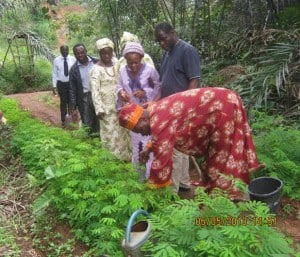
US Charity Trees for the Future through its Cameroon program has successfully planted over 1.5 million multipurpose agroforestry species including; Acacia angustissima, Leucaena leucocephala, Calliandra calothyrsus, Moringa oleifera, Neem, Prunus africana, Date palms, Podocarpus sp in four regions of Cameroon including the Southwest, Northwest, Littoral and West regions as of September 2013. Current trends show that by the end of the year, over 2 million trees would have been planted.
This revelation was uncovered in November, following an evaluation trip by the Trees for the Future team in Cameroon of trees transplanted in farmer’s fields. Farmers especially the new ones were very motivated in implementing the priority technologies including alley cropping and live fencing. The collective interest of the new and old farmers is one of the main factors that led to over 1.5million trees so far transplanted in the South West, North West, West and Littoral Regions by over 250 Farmer’s groups. However, while the old farmers are already benefiting from the trees by mulching the leaves into the soil and getting greater output, the new farmers are anxious to start using the leaves of these plants as natural fertilizer in order to boost their output after the third year.
This is an important step towards developing the local economy of nations especially emerging nations like Cameroon. Improving agricultural practices and increasing food security through increase productivity has always been the top priority of the nation. Over the years, Trees for the Future through their agroforestry activities has been working towards achieving this goal.
The presence of this program has continued to improve on the living standards of the people in communities in the South West, North West, West and Littoral Regions of Cameroon who have confessed of having witnessed an increase in food production since Trees for the Future introduced them to agroforestry.
By Payong Prudence



